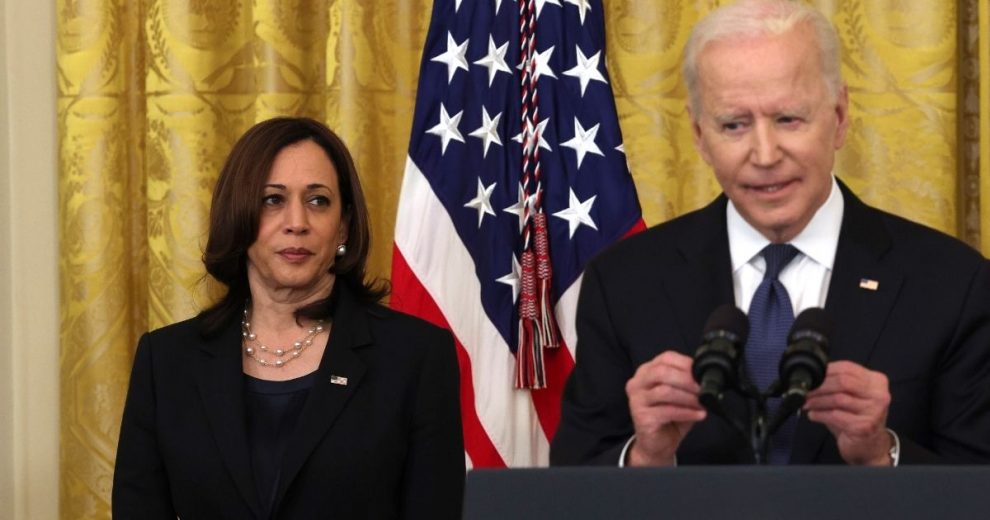Inflation at a 13-year high, gas shortages, a jobs report that missed the mark by nearly 500 percent — is there any reason to feel economic confidence in President Joe Biden’s administration?
Americans certainly don’t think so. According to a Gallup poll released Monday, the economic confidence index fell back into negative territory after rising during the first months of Biden’s presidency.
Gallup’s Economic Confidence Index, which was +2 in April, went down to -7 in May.
That’s the same level it was at in March, Gallup reported. The numbers have been steadily rising over the past few months, although the polling firm noted there could be reasons for the sudden downturn.
“The recent shifts in confidence may reflect public reaction to a stronger-than-anticipated jobs report in April, followed by a weaker-than-expected report in May,” Gallup reported.
“Last month, Americans were more positive than negative on both measures, while their readings are net-negative on both this month. Twenty-seven percent of Americans now rate current economic conditions as excellent or good, while 30% rate them as poor. Meanwhile, 43% say the economy is getting better, and 53% say it is getting worse.”
This is, mind you, as the country gets back to some semblance of normal. States are opening up, vaccines are readily available and we’re even starting to ditch the mask and get together in public again. We should be thrilled, right?
We’re not — and according to Gallup’s numbers, that’s bad news for the Biden administration.
“Greater concern about the economy is also apparent in the increased percentage of Americans mentioning an economic issue when asked to name the most important problem facing the U.S. Currently, 21% cite an economic issue — such as the economy in general, unemployment or the federal budget deficit — up from 14% in April and the highest since April 2017,” the Gallup news release stated.
“Even during the worst phases of the coronavirus pandemic, Americans’ attention was focused more on the coronavirus and other issues as the most important problem, including times when economic confidence was much lower than today. Before the current survey, the highest percentage mentioning economic matters as the most important problem since the pandemic began was 19% in June.”
While Republicans were the primary driver of the negative economic confidence numbers — they expressed -52 confidence in the economy, compared to +27 for Democrats and -3 for independents — concerns regarding the economy showed a different story.
“Mentions of economic issues as the most important problem are up similarly among all party groups, including a seven-percentage-point increase among Republicans (to 24%), an eight-point increase among independents (to 22%), and a six-point increase among Democrats (to 18%),” the news release read.
The poll, conducted between May 3-18 among 1,016 adults, had a margin of error of 4 percent.
Why the worry? We can start with the April jobs report, which came in with 266,000 new jobs added.
This would have been good in any normal month, but this isn’t any normal year, and economists were looking for a figure of well over 1 million new jobs.
How bad of a miss was this? Watch Steve Liesman of CNBC’s “Squawk Box” react to the announcement on air, unconvinced he has the right numbers:
BREAKING: April jobs report: +266k, a big miss from consensus forecast of +1M. Labor force participation rate was 61.7%. https://t.co/nqqgoAfjzu pic.twitter.com/ISmKzzrNZs
— CNBC (@CNBC) May 7, 2021
Unemployment also crept up to 6.1 percent.
Biden was unfazed:
“The earliest signs from this job report, just announcing today, are promising,” he said after the numbers were announced. “And the American Rescue Plan is starting to make a real difference.
“Today, there is more evidence our economy is moving in the right direction.”
Inflation is a concern, too. The Bureau of Labor Statistics reported earlier this month that the yearly inflation rate was 4.2 percent, the highest since 2008. For reference, the Federal Reserve generally sets the target rate at about 2 percent.
And, given the economic issues the country faced during the pandemic, that could mean stagflation — inflation with poor GDP growth — is on the way.
Meanwhile, the shutdown of the Colonial Pipeline by hackers earlier this month left 65 percent of gas stations in North Carolina without fuel — and while that was the hardest-hit state on the East Coast, there were other states where well over 40 percent of gas stations were dry.
However, this already accelerated a trend that we’ve seen under the Biden administration. According to data from the Energy Information Administration, the average U.S. price of a gallon of gas has increased from $2.46 a gallon on Jan. 18, just before Biden’s inauguration, to $3.11 now.
The majority of that jump happened before the Colonial Pipeline hack, although that complication certainly didn’t help. Whatever the case, that’s the highest the gas price has been since the Obama presidency.
So, remember all of that rosy confidence the media had when Biden took office? How, thanks to vaccines, things would be up, up and away? It hasn’t worked out that way, and the president’s only answer is to spend our way out of the problem — except building back better hasn’t seemed to work so far.
If he thinks those economic confidence numbers are low now, just wait.
Story cited here.
























